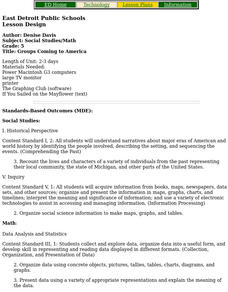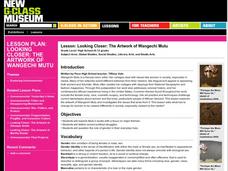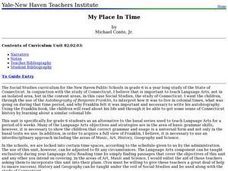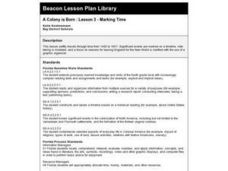Curated OER
Groups Coming to America
Fifth graders use text or other references to locate different types of information about the Mayflower and pilgrims. They create a presentation for lower elementary classes about the Pilgrims.
Curated OER
The Mayflower Compact
Middle schoolers use primary source documents to discuss the Mayflower Compact and the story of the first Thanksgiving. They discover how the Pilgrims were influenced in developing a community and American democracy.
Curated OER
"What Do You Mean?" How Language Changes Over Time
Students examine words used at Jamestown in 1607. They predict what the words meant in 1607, write sentences using three of them, then analyze the sentences after they have read the actual definitions of the words.
Curated OER
Art or Artifact?
High schoolers analyze and discuss illustrations of the New World by John White. They examine the images, answer questions about each one, and write an essay.
Roy Rosenzweig Center for History and New Media
European Explorers
To compare how the Spanish, French, and English approached the exploration of North America, class groups examine primary source documents and become experts on one of four explorers: Francisco Coronado, Robert LaSalle, Samuel de...
Curated OER
Tintin and I: Primary and Secondary Sources
Mickey Mouse, Elmo, and Tintin? Belgian cartoonist Georges (Herge) Remi’s famous comic character launches a study of primary and secondary source material and the impact these sources have on storytelling. Class members also examine the...
Curated OER
Lesson: Looking Closer: The Artwork of Wangechi Mutu
Social issues of gender and media stereotypes, begins with a multi-sensory experience. Learners view the painting Backlash Blues and make critical comments based on what they see. They then read the Langston Hughes poem and listen to the...
Curated OER
Road to Revolution
Learners discuss reasons war erupted between Britain and the colonies. They examine and explain critical events of the 1760s, and discuss what rights and beliefs Americans felt were being violated.
Curated OER
Democratic Revolutions
Students study the Age of Revolutions. In this Latin America instructional activity, students consider how democratic revolutions around the world led to imperialism in Latin America.
Curated OER
Imperialism in Africa
Students study imperialism in Africa. In this Imperialism lesson, students consider how democratic revolutions around the world led to imperialism in Africa.
Curated OER
Why Did Delawareans Use Slaves?
Students read about an indentured servant, and complete a chart comparing slaves and indentured servants.
Curated OER
Birth of a Nation
Fifth graders portray one of the actual framers of the Constitution. They summarize each class period with a journal entry and culminate the experience with the actual framing and signing (or not signing) of the Constitution.
Curated OER
Dos mapas de Florida, el Caribe y parte de Sur America
What can maps tell us about the past? Find out with a Spanish lesson that incorporates geography. After examining maps individually, comparing two old maps of Spanish Florida and writing notes in the provided Venn diagram, pupils pair up...
Curated OER
My Place In Time
Sixth graders interpret Franklin's style, his ease of writing and content, using this to inspire, motivate and guide them to do more writing. They list Franklin's civic accomplishments and political accomplishments. They name 4...
Curated OER
America Established Because of Protest
Students explore events and causes that led to American Revolution and examine popular pro-Patriot renderings and texts of these issues created both at that time and in later years. Students then prepare and deliver oral presentations...
Curated OER
A Colony is Born : Lesson 3 - Marking Time
Fifth graders refer to text and timeline to fill in a graphic organizer and timeline from 1492-1607. They participate in a class discussion that allows for speedy accumulation of events and fill in their own timelines. They work in small...
Curated OER
Four Enlightenment Thinkers
Students examine lives, philosophies, and political beliefs of four Enlightenment Thinkers: Baron de Montesquieu, Jean-Jacques Rousseau, Thomas Hobbes, and John Locke. Students then work with partner to write short speech from...
John F. Kennedy Presidential Library & Museum
Military Advisers in Vietnam: 1963
How did the beginning of the Vietnam War factor into the Cold War with the Soviet Union? As part of a study of American involvement in Vietnam, class members read a letter address to President Kennedy and his response in which he...
Curated OER
How did Geography Affect the Economy of the Colonies
Eighth graders examine the impact of geography on a region. In this geography lesson, 8th graders study the themes of geography. Students write an open response to a question.
Curated OER
Community & Architecture
Students investigate the Bamum people of Cameroon and the use of symbols in African societies. They read a handout, and design a palace using African symbols, presenting and describing their design to the class.
Curated OER
A Full Military Experience
Eighth graders watch electronic field trip entitled Call to Arms, and simulate daily life of eighteenth-century soldier, including marching, camp building, cannon firing, and sharing common meal. Student groups form regiments by signing...
Curated OER
1986 Capsule: Hispanic Influence in the New World
Students research the conditions in Spain during the 15th and 16th centuries. In groups, they write a paper on the information they gathered during their research and why the situation is unique to Spain. As a class, they discuss the...
Curated OER
Exploring Pioneer America
Fourth graders research pioneers who had a strong influence on westward expansion. In this westward expansion lesson, 4th graders write an essay about four pioneers and an interview script about one. Students work in pairs to present...
Curated OER
Reconstruction of Iraq: A Lesson of Historical Precedents
Students view a video clip about the reconstruction efforts in Iraq. They work together to compare and contrast the reconstruction plans after the Spanish-American War and World War II. They compare those results to the situation in Iraq.

























